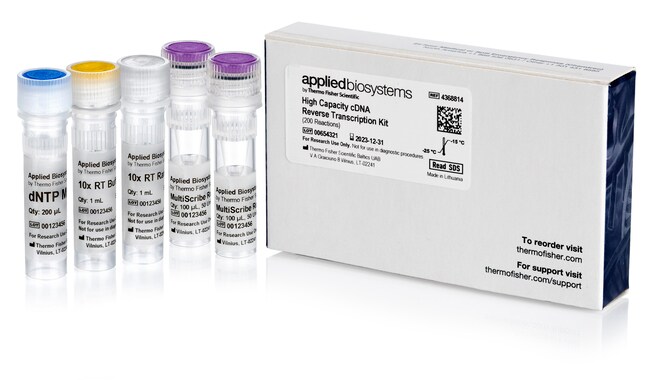Search Thermo Fisher Scientific

Kit de transcripción inversa de ADNc de gran capacidad
| Número de catálogo | Incluye | N.º de reacciones |
|---|---|---|
| 4368814 | Kit only | 200 reacciones |
| 4374966 | Kit with Rnase Inhibitor | 200 reacciones |
| 4368813 | Kit only | 1.000 reacciones |
| 4374967 | Kit with Rnase Inhibitor | 1.000 reacciones |
Las características de este kit incluyen:
• Amplificación de objetivo lineal para PCR en tiempo real
• Producción y precisión más elevadas que otros kits de síntesis de ADNc con un coste mucho menor
• 10 veces mayor rango dinámico que otros kits
Ampliamente probado con una gran variedad de moldes
La síntesis cuantitativa de la primera cadena de todas las especies de ARN se logra con el uso de cebadores aleatorios. El kit se ha sometido a comprobaciones exhaustivas con una gran variedad de moldes de ARN, incluidos ARN y objetivos ricos en bases G-C y A-U expresados en niveles bajos. El ARNc también se puede generar de manera eficaz a partir de una transcripción in vitro del ADNc.
• Tampón RT 10X, 1 ml
• Cebadores aleatorios RT 10X, 1 ml
• Mezcla dNTP 25X, 0,2 ml (100 mM)
• Transcriptasa inversa MultiScribe, 0,1 ml (50 U/μl)
Almacenar entre –25 °C y –15 °C.
Los clientes que vieron este artículo también vieron
Documentos y descargas
Certificados
Hojas de datos de seguridad
Preguntas frecuentes
You can store your cDNA at 2-6 degrees C for up to 24 hours. For long-term storage, store the cDNA at -15 to -25 degrees C and add EDTA to a final concentration of 1 mM to prevent degradation.
Yes. You can use the reagents from the High Capacity cDNA Kit PN 4368814 (without RNAse Inhibitor) or 4374966 (with RNAse Inhibitor). Make sure to use the reverse transcription primer provided from the TaqMan miRNA assay for the reverse transcription.
We recommend the following kits:
Find additional tips, troubleshooting help, and resources within our PCR and cDNA Synthesis Support Center.
Yes, the 10X RT Buffer can be purchased as a stand-alone item (Cat. No. N8080010).
Find additional tips, troubleshooting help, and resources within our PCR and cDNA Synthesis Support Center.
It contains a blend of 100 mM solution of dNTP (25 mM each of dATP, dCTP, dGTP and dTTP).